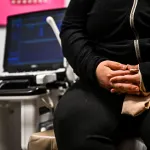A six-week abortion ban in Ohio has forced people with cancer to travel out of state for abortions that are necessary to continue with life-saving treatment, according to affidavits submitted by abortion providers in the state. In at least two cases, cancer patients have been blocked from receiving treatment until their pregnancies were terminated — and getting an abortion required them to leave the state.
The cases underscore how abortion bans — even those with exceptions to save the life of the pregnant person — have upended patients’ lives and limited doctors’ abilities to provide essential medical treatments.
After Roe v. Wade was overturned in June, Ohio banned abortion at six weeks of pregnancy, a law that was blocked by courts on September 14. That abortion ban has an exception for saving the life of the pregnant person. And though the law does not criminalize pregnant people, medical providers can face a year in prison for providing abortions past six weeks, along with additional fines.
Abortion is currently available up to 20 weeks of pregnancy in Ohio while the law is blocked. It’s not clear when it will take effect again.
But, the affidavits show, in the two and a half months that the state’s six-week ban was enforced, the law had drastic consequences.
The Ohio affidavits — part of a case challenging the constitutionality of Ohio’s six-week ban — illustrate a much broader phenomenon, said Leilah Zahedi-Spung, a maternal fetal medicine physician in Tennessee, where abortions are banned entirely. In many states that are enforcing abortion bans, she said, physicians are navigating the same conundrum, and the risk of being jailed is likely deterring them from offering abortions to patients who would need them to start chemotherapy. Chemotherapy is typically not advised for people in their first trimester of pregnancy, since it can harm fetal development or even increase the risk of a miscarriage.
-
More from The 19th
- Education Department reinforces Title IX protections for abortion and pregnancy
- Label change for mifepristone could reduce barriers to care for miscarriages, advocates say in petition to FDA
- 70% of Americans don’t trust politicians to make abortion policy, 19th News/SurveyMonkey poll finds
Since Roe was overturned, doctors have attested that language around medical exceptions to abortion bans is vague and confusing. Many clinicians have reported that they do not feel safe providing an abortion — even if it is the correct and appropriate form of care — until the patient’s condition has progressed to the point where they could die imminently.
“I don’t know anybody that would feel comfortable treating a pregnant patient with cancer because I don’t feel like they’re nearly dead enough,” Zahedi-Spung said. “The threshold that I am holding in order to provide abortion care is basically almost dead to try to avoid being arrested and jailed.”
In one Ohio case, described in an affidavit by Planned Parenthood Southwest Ohio Medical Director Sharon Liner, a 25-year-old woman with cancer was already undergoing chemotherapy before she learned she was pregnant. When she discovered her pregnancy, doctors told her she was unable to continue receiving her cancer treatment while pregnant. And at eight weeks pregnant, she could not legally obtain an abortion in Ohio.
The woman’s doctor, Liner said in the affidavit, did not feel comfortable providing paperwork indicating that she medically qualified for an abortion, like many physicians who are nervous about the hefty criminal penalties possible if one is found to have provided an abortion. The woman had to travel out of state to terminate her pregnancy. Only upon returning could she continue her delayed chemotherapy.
“The past two months have been horrendous for our patients,” Liner said in the affidavit.
An employee at the Women’s Med Center of Dayton described a similar case. A 37-year-old woman came for an abortion June 27 — three days after the Supreme Court’s decision to overturn Roe. The patient had stage three melanoma and had been told she needed an abortion before she could continue receiving cancer treatment, per a submitted affidavit by Aeran Trick, operations manager at the clinic.
Because her pregnancy was past six weeks, the woman could not receive an abortion in Ohio.
“Upon learning that she would need to travel out of state to have her abortion, the patient broke down and cried inconsolably, despite the attempts of multiple staff, including myself, to comfort her,” Trick said in the affidavit.
Ohio abortion providers have challenged the state’s six-week abortion ban in state court, arguing that the state constitution’s privacy protections include a right to an abortion. In agreement, a judge in Hamilton County has blocked the six-week ban while this case goes through the state courts — meaning that abortions are currently available up to 20 weeks pregnancy in Ohio.
Beyond issues with cancer treatments, Ohio abortion providers testified to hearing patients discuss suicide if they could not receive an abortion. One also said she would consider drinking bleach to end her pregnancy; another asked how much vitamin C she had to ingest to induce an abortion — both practices that would seriously endanger the patients. None of the providers who testified in these affidavits were available for comment.
Research shows that women are more likely to seek health care when they become pregnant. That means patients may not even learn they have cancer until they come in for their first prenatal visit.
Those are often emotionally fraught conversations, Zahedi-Spung said, particularly for patients who intended to become pregnant and did not know about their cancer. If the disease is still in its early stages, some may attempt to surgically remove it, then wait for the pregnancy to reach its second trimester. If needed, they can begin chemotherapy at that point, hoping that the cancer has not progressed too far in the meanwhile.
But others, particularly those whose cancer is already more advanced, may need to get an abortion, begin chemotherapy and then try to become pregnant after, once they have completed treatment. There are even further complications there since chemotherapy can damage someone’s fertility.
In those cases, telling patients that they cannot receive an abortion in state becomes even more difficult.
“It’s awful for patients,” Zahedi-Spung said. “And then you have to say, ‘By the way, the state of Tennessee doesn’t think you’re dying enough, so for you to get the care you need now that you’ve made this tough decision, you have to go to an abortion clinic out of state.”
In Tennessee, patients who seek abortions are largely traveling to clinics in North Carolina, South Carolina and Illinois, where there are often weeks-long wait lists for an appointment. In some states, such as New Mexico, wait times are as long as four to six weeks.
That delay in getting an abortion has other consequences. It means a more advanced pregnancy that will cost more to terminate. And it delays when patients can start cancer treatment, increasing the risk of a more advanced disease.
“If you were open to terminating, I would say we need to do that as soon as possible,” Zahedi-Spung said. “You’re fighting with a clock of this cancer that’s growing.”







